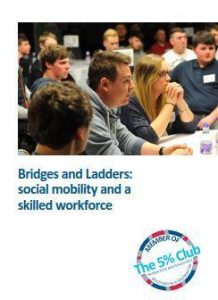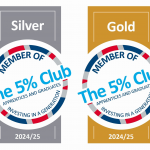Featuring a forward by Nick Clegg, The 5% Club’s latest thought leadership report identifies how improving the transition from school to work for all young people, but particularly for those who do not go on to study A Levels and Higher Education, can improve social mobility and provide the skilled workforce the UK will need now and in the future.
 The UK has been hugely successful in tackling unemployment in recent years. The jobless rate is at its lowest level since 1975 and the employment rate has never been higher. But the UK is facing a national skills shortages in key industries, while youth unemployment (including graduates) stands close to 13%[1].
The UK has been hugely successful in tackling unemployment in recent years. The jobless rate is at its lowest level since 1975 and the employment rate has never been higher. But the UK is facing a national skills shortages in key industries, while youth unemployment (including graduates) stands close to 13%[1].
At the same time, according to the Social Mobility Commission, social mobility in the UK is getting worse for a generation of young people. Young people from low-income homes are a third more likely to drop out of education at 16 and 30% less likely to study A-levels that could get them into a top university[2]. They often do not know what options are available to them and can end up in low-skilled, low-paid jobs, jobs which are disappearing due to increasing automation and digitization.
Evidence from other countries demonstrates that a high-quality vocational-education system can be a powerful driver of social mobility by acting as a mechanism helping students from less advantaged backgrounds access higher education for the first time.
Our latest report highlights that more must be done to improve social mobility and outlines 12 recommendations we see as key to making the progress and change required.
We must reach parity of esteem between academic and vocational and technical routes: no one should be prevented from achieving their full potential because of the route they took to qualification. ‘Earn and learn’ must be seen as an option equal to academic routes.
The 5% Club, a movement of more than 250 businesses committed to embedding the ethos of ‘earn and learn’ into their organisations, firmly believes that where you are from should not dictate where you are going. By offering a wide range of ‘earn and learn’ opportunities our members create meaningful career paths for thousands of young people every year and create a workforce with the skills the UK economy will need to thrive.
To read the paper in full, click here.




